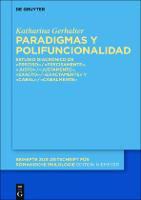Paradigmas y polifuncionalidad: Estudio diacrónico de «preciso»/«precisamente», «justo»/«justamente», «exacto»/«exactamente» y «cabal»/«cabalmente»
| dc.contributor.author | Gerhalter, Katharina | |
| dc.date.accessioned | 2021-11-05T04:08:12Z | |
| dc.date.available | 2021-11-05T04:08:12Z | |
| dc.date.issued | 2020-11 | |
| dc.identifier.isbn | 978-3-11-063360-3 | |
| dc.identifier.uri | https://library.oapen.org/handle/20.500.12657/51321 | |
| dc.description.abstract | This book deals with the historical development of a group of four Spanish adjectives and adverbs: preciso / precisamente, justo / justamente, exacto / exactamente and cabal / cabalmente. Based on large historical corpus data-samples, this study combines quantitative and qualitative analysis with semasiological and onomasiological approaches and its focus lies on the diachronic development of three discourse functions (focussing, affirmation and reformulation). The results are discussed with reference to current theories of language change (grammaticalization, pragmaticalization, thetical grammar and cooptation) and explanatory factors such as analogy and changes in frequency. | |
| dc.language | Spanish | |
| dc.subject.classification | thema EDItEUR::C Language and Linguistics::CF Linguistics::CFG Semantics, discourse analysis, stylistics | en_US |
| dc.subject.classification | thema EDItEUR::C Language and Linguistics::CF Linguistics::CFF Historical and comparative linguistics | en_US |
| dc.subject.classification | thema EDItEUR::C Language and Linguistics::CF Linguistics::CFK Grammar, syntax and morphology | en_US |
| dc.subject.classification | thema EDItEUR::2 Language qualifiers::2A Indo-European languages::2AD Romance, Italic and Rhaeto-Romanic languages::2ADS Spanish | en_US |
| dc.subject.other | Language change, discourse functions, pragmatics-syntax-semantics-interfaces, adverbs | en |
| dc.subject.other | ÖFOS 2012, Romance studies | en |
| dc.subject.other | ÖFOS 2012, Corpus linguistics | en |
| dc.subject.other | ÖFOS 2012, Historical linguistics | en |
| dc.subject.other | Sprachwandel, Diskursfunktionen, Schnittstelle Pragmatik-Syntax-Semantik, Adverbien | de |
| dc.subject.other | ÖFOS 2012, Romanistik | de |
| dc.subject.other | ÖFOS 2012, Korpuslinguistik | de |
| dc.subject.other | ÖFOS 2012, Historische Linguistik | de |
| dc.title | Paradigmas y polifuncionalidad: Estudio diacrónico de «preciso»/«precisamente», «justo»/«justamente», «exacto»/«exactamente» y «cabal»/«cabalmente» | es |
| dc.type | book | |
| dc.type | book | |
| oapen.abstract.otherlanguage | Anhand einer historischen Korpusanalyse werden die spanischen Adjektiv-Adverb-Paare justo / justamente, cabal / cabalmente, preciso / precisamente y exacto / exactamente aus semasiologischer sowie onomasiologischer Perspektive analysiert. Die Studie kombiniert quantitative und qualitative Analysen und das Hauptaugenmerk liegt auf der diachronen Entwicklung der drei Diskursfunktionen (Fokussierung, Affirmation und Reformulierung). Die Ergebnisse werden im Rahmen gängiger Modelle des Sprachwandels (Grammatikalisierung, Pragmatikalisierung, Subjektivierung, cooptation) diskutiert und erklärende Faktoren wie Analogie und Veränderungen in der Häufigkeit herangezogen. | |
| oapen.relation.isPublishedBy | De Gruyter | |
| oapen.relation.isFundedBy | 0bdd30b8-28cc-4e2d-bd69-6cabb77b36d4 | |
| oapen.collection | Austrian Science Fund (FWF) | |
| oapen.imprint | De Gruyter | |
| oapen.grant.number | PUB 694 |

